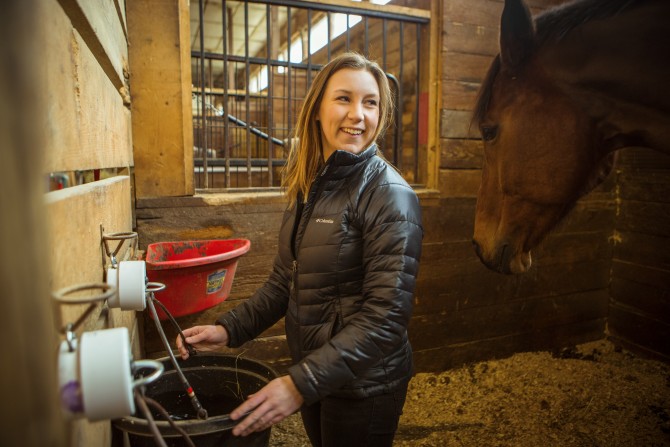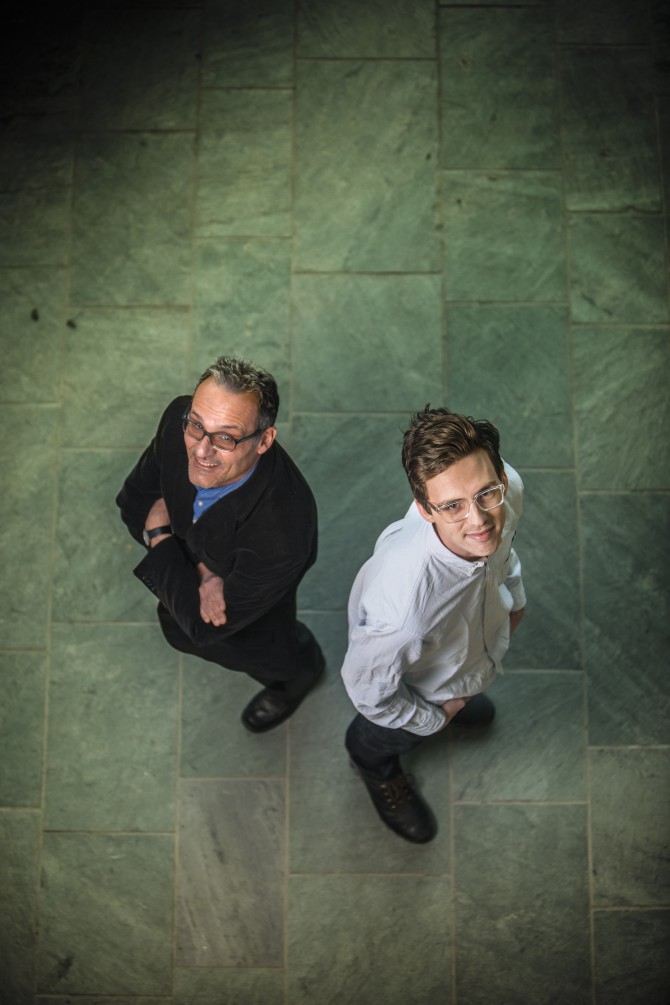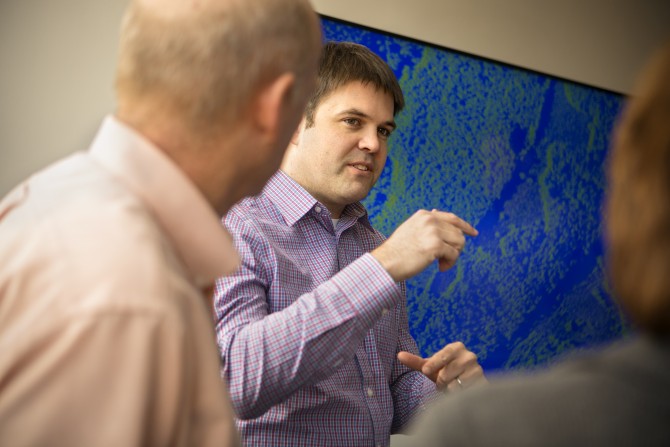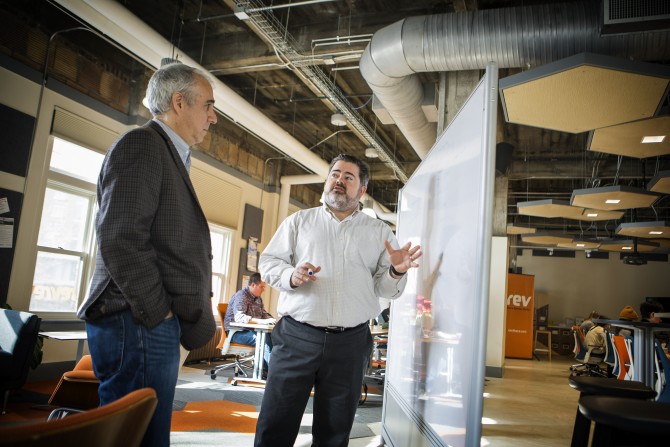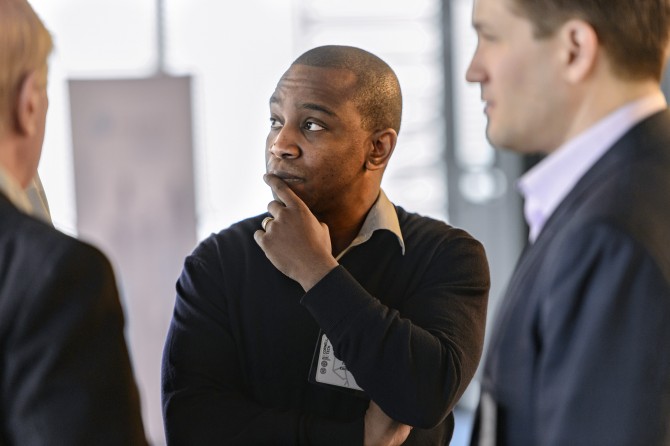Entrepreneurship: A developing ecosystem of, through and beyond Cornell
It is not an exaggeration to say entrepreneurship is woven throughout Cornell's academic culture. After all, the university's co-founder and namesake, Ezra Cornell, was a 19th-century entrepreneur who made his fortune in the telegraph business. Today, entrepreneurship is fostered in numerous ways that reflect the university's educational and public service mission and interdisciplinary ethos.
Through research, coursework, fellowships, leadership initiatives, business incubators, community outreach, business plan competitions and more, an evolving entrepreneurial ecosystem has emerged at Cornell. Its reach extends throughout the university, from minds and hubs across the Ithaca campus and into the local community to the entrepreneurial dynamo at the heart of the Cornell Tech curriculum and within the innovations created by Weill Cornell Medicine researchers. Entrepreneurial principles are taught and applied not only to encourage self-empowerment and economic development, but also to seek solutions to pressing social concerns.
A two-year transformation
Mechanical engineering major Caitlin Parrucci '15, M.Eng. '16, has ridden horses since she was a child. In caring for them, she noticed a familiar problem. When a horse is cared for by several people, as is common at larger equine facilities, it's difficult to track how much water each horse consumes. A change in water intake can lead to colic and can indicate anything from stress to kidney failure.
"That's when I decided I would work on a system that would give more information on a horse's health and track it more closely than a human can," says Parrucci, founder and chief executive officer of Stablesense.
She signed up for courses in innovative product design, which gave her what she describes as "the entrepreneurial bug and the bug for product design"; entrepreneurship classes at the Samuel Curtis Johnson Graduate School of Management; and an entrepreneurial finance class in the School of Hotel Administration. Parrucci built the first prototype of her idea in the Southern Tier Startup Alliance's Hardware Accelerator at Rev: Ithaca Startup Works. (The Southern Tier Startup Alliance is a member organization of business incubators such as Rev, a collaboration of Cornell, Ithaca College and Tompkins Cortland Community College to offer a nonprofit resource for the local startup business community.)
Parrucci presented her idea at an entrepreneurship kickoff event sponsored by Entrepreneurship at Cornell in September 2015, winning the $1,010 first prize and an invitation to join eLab, Cornell's capstone accelerator program for student startups. During eLab's entrepreneurship celebration in April 2016, she accepted the $5,000 first prize. Since then, her company was invited to join Rev, and she has rebranded Equine Design as Stablesense, which now has a team of four.
Parrucci believes that Stablesense will be able to start sales of the monitoring system within the next year.
"Two years ago, I did not know what a business model canvas was. I had no idea how to lay out a financial projection or how to go beyond basic stages of 3-D printing a prototype. I did not have a grasp on the marketing process, much less how to reach out to get investment," says Parrucci. "I have been very lucky to meet fantastic people who have been great resources to me and have helped Stablesense at key developmental stages of its journey."
Learning the language of entrepreneurship
Lance R. Collins, the Joseph Silbert Dean of Engineering, says he has met many doctoral students and graduates who tried to start businesses based on technology they created but failed because they lacked an understanding of business practices.
"It came to me that we should develop programming to help our Ph.D. students become more successful as business entrepreneurs," Collins says.
The Ph.D. Commercialization Fellowship is a six-month funded fellowship in which engineering doctoral students get an opportunity to immerse themselves in the commercialization process and potential real-world applications of their inventions. The program supports the fellows through personalized guidance, mentorship and a collaboration with Johnson MBAs, which allows fellows to focus on developing entrepreneurial/business skills that can benefit them in academia, industry or in starting their own company.
"When I first heard about the fellowship I thought it sounded really cool, but my Ph.D. research work has no commercial potential whatsoever," says William Robert Bedell, Ph.D. '17, one of the first six Ph.D. commercialization fellows.
So Bedell looked for a technology to work with during the fellowship and chose infection-free insect cell lines – proprietary lines of insect cell cultures that could serve as the production basis for the first wave of commercial therapies that treat a disease by introducing genes, in the form of RNA or DNA, into a patient's body. Similar gene therapies under development tend to harbor viral infections, which can be costly to remove from the cultures.
The commercialization fellowship experience helped Bedell gain a greater understanding of biopharmaceuticals, the field he wants to work in, but in a business development role, as opposed that of a bench scientist.
"That's a hard field to break into. Most of the people you see in those roles have years and years of experience," Bedell says. "But with the help of the [fellowship] … I'm a lot closer to getting into a position like that."
Emmanuel Giannelis, the Walter R. Read Professor of Engineering and associate dean for research and graduate education at Cornell Engineering, says a program such as the Ph.D. Commercialization Fellows is about providing expanded educational opportunities for doctoral students.
"Ph.D. programs all go deep into the science and technology and rarely, if ever, consider other questions such as building the business case or prototyping and testing, the kinds of things that are important in order to get the technology to move from the bench to the real world," says Giannelis.
In addition to the Ph.D. Commercialization Fellows, Cornell has joined with the Rochester Institute of Technology and the University of Rochester to create the New York I-Corps Node. In September 2016, the consortium was awarded $4.2 million from the National Science Foundation Innovation Corps Program to lead entrepreneurship and commercialization support programs targeted at the scientific community through an NSF Node serving the Northeast.
Tom Schryver, MBA '02, executive director of Cornell's Center for Regional Economic Advancement and a visiting lecturer at the Johnson School, directs the I-Corps Node. "Researchers can come up with amazing inventions, but translating them to social and commercial impact requires a different lens – understanding customers who have opportunities enabled and problems solved by these new technologies, and the ecosystems in which these customers operate. I-Corps is a proven method deployed by the NSF to teach researchers about the commercial environment and accelerate startup formation and success."
Doing good by doing well
Marya Besharov, associate professor of organizational behavior in the ILR School, defines social entrepreneurship as "pursuing a social mission through a commercial venture." She views it as a window to a broader issue she thinks is important to all types of organizations – whether they are businesses that are created and designed to address a social problem or traditional nonprofit or for-profit organizations – that they "all have this mix of social aims and business aims."
"There have always been social concerns in businesses, and nonprofits have to be financially viable," Besharov says. "I view social entrepreneurship as … a kind of hybrid of the two, but not completely divorced from traditional businesses and traditional nonprofits."
Many Cornell students are interested in social entrepreneurship, particularly at the ILR School, which attracts students with a "strong social-justice orientation," says Besharov. "But they also need to make a living and are mindful that business has become so dominant in our society, and they are grappling with the question of 'How can I do both?'"
During a summer internship in a rural health clinic in Peru, Lauren Braun '11 came up with an idea that transformed her life and is now transforming the lives of others.
"My job was to go up into these mountain villages with nurses and go door to door looking for moms to remind them their babies were due for vaccinations," Braun recalls.
The Peruvian government provides the vaccines for free, but many were being wasted because mothers in the remote villages often forgot to bring in their children in a timely fashion.
During the last week of her internship, Braun started sketching a design for a bracelet worn by children that would remind the mothers to get them vaccinated. Braun sought input from several of the mothers and nurses, and their responses were overwhelmingly positive.
Braun spent her last two years at Cornell learning how to establish and operate a nonprofit organization. She took courses in social entrepreneurship, women and leadership, and leadership in nonprofits, most of which required drafting a business plan. Braun also sought one-on-one conversations with leaders in the pharmaceutical industry and nongovernmental organizations.
She developed a bracelet that sidesteps language barriers and illiteracy by using symbols to show mothers the vaccinations their children need and numbers to show when they are due. The bracelet is to be worn by a child from birth to age 4 – with the goal that more children will live to age 5 and beyond.
Braun presented her idea in the Entrepreneurship at Cornell's 2011 Big Idea Competition and founded a nonprofit, Alma Sana (Spanish for "healthy soul"), which was awarded a $100,000 Gates Foundation grant in 2012 for initial field testing. After completing a successful pilot with the health ministries of Peru and Ecuador, Alma Sana is now launching new partnerships with NGOs and governments to deliver the bracelet in Nigeria, Pakistan and Afghanistan, where polio remains endemic.
"I think a lot of millennials relate to this," says Braun. "You want to do something where your time every day is related to a greater mission or purpose."
Untapped resources
Adam Maher '06, M.Eng. '07, founder and president of Ursa Space Systems, started his company in Silicon Valley and admits that some might think it was "counterintuitive" to move Ursa to Ithaca. A native of nearby Homer, New York, Maher attended an event at Rev during a visit to the area, and it sparked his interest about the Ithaca startup community.
"There's the right culture and willingness to succeed here in Ithaca that's very important for a startup," he says.
Maher had worked with Mason Peck, associate professor of mechanical and aerospace engineering, when he was at Space Systems Loral and Peck was working with NASA. He talked with Peck about his idea for a geospatial services startup, and Peck told Maher that there was no company like that near Cornell.
Maher, who set up shop at Rev in January 2015, says that conversation told him there were "untapped resources" to take advantage of, particularly Cornell's resources in engineering and a "huge base of talent" from Cornell and other regional institutions.
"RIT is a top school for image science that's just up the road, and there's the Air Force research laboratory in Rome," says Maher. "People don't realize a lot of the advances in radar are done in Syracuse."
Ursa Space Systems' first home was at Rev. However, much more important than real estate is the support Ursa has received from the local startup community and mentors at Rev.
"Being there and being able to interact with mentors every day when we were first starting the company was very valuable for us because they help you in how you think about your business and figuring out how to focus your business," Maher says.
Schryver says that there's always been a level of startup activity in Ithaca and Tompkins County, but there hasn't "consistently been a startup community or ecosystem that people could check into." A goal of Rev is to counteract the narrative that upstate New York is economically depressed, he says.
Many on the Rev team teach entrepreneurship and related topics at Cornell or Ithaca College. Ken Rother, Rev's director of hardware entrepreneurship, runs a summer accelerator program called "Napkin to Prototype," which helps entrepreneurs create businesses centered on physical products; he's also piloting a course on that topic at Johnson and regularly brings the class to Rev to use its prototyping lab.
"We're not there to judge whether they've got a business or not; we help give them the tools so they can judge for themselves," says Rother, who is also one of Rev's four entrepreneurs-in-residence. "If they … form a business entity, want to come into Rev and we think Rev can help them move along, [our] role is to continue to coach them."
Entrepreneurial generators of innovation
In New York City, Weill Cornell Medicine and Cornell Tech are both fostering an ecosystem of entrepreneurship and innovation. Weill Cornell Medicine recently launched the Dean's Entrepreneurship Lab, which provides resources and educational opportunities to students and faculty who have ideas with commercial potential that they want to take from the lab to patients.
"During my Ph.D. program, I was struck by how many talented and creative people with really, really great ideas there are here at Weill Cornell," says Entrepreneurship Lab Director Sarah Kishinevsky, Ph.D. '16. "However, as researchers and clinicians, our training focuses on the research process; to translate these inventions to patients, we also need to have an understanding of the commercialization process. Through the Dean's Entrepreneurship Lab, we're helping people write business plans, find the right investors, create a company and … improve their chances of successfully translating their invention to the clinic."
The entrepreneurial culture at Cornell Tech, says Aaron Holiday, MBA '12, Cornell Tech's managing entrepreneurial officer, is integrated into the core curriculum to bring together diverse groups of disciplines in a studio environment. Cornell Tech's Studio Curriculum typically makes up about one-third of the academic experience.
"We break down the iron curtain between business schools and engineering schools," fostering an environment where students from different disciplines work collaboratively, Holiday says.
"In the world we live in today, to build rapidly growing successful companies you need a combination of people to be successful: engineers, domain experts, business experts," says Holiday. "One of the assets that Cornell Tech has is the opportunity to bring people together who may not otherwise come together."
At Cornell Tech, the path to a startup begins in the fall semester in a class called Startup Ideas, which focuses on the process of developing and refining business ideas among an interdisciplinary group of students. Students form teams, and by the end of the class the teams choose one idea to pursue in the Startup Studio class. By the end of the Startup Studio, the teams must have a working product ready, as well as the ability to present it to external people, some of whom are investors.
"Entrepreneurialism is the core of the structure of the program," says David Tisch, a successful tech entrepreneur and head of the Startup Studio. "It's all built around the idea of practical learning and exposure to the thrills and challenges of building something yourself and empowering yourself to start something."
As of the end of 2016, Cornell Tech students had formed 29 startup companies with 62 founders that have attracted investments of more than $15 million. These companies employ more than 100 people thus far with more than 90 percent located in New York City, says Holiday.
"I think the world is moving in our direction in the sense that people [can] take more control over their destinies as the barriers to start companies come down," says Tisch. "I think young people have an appreciation for what technology can do. As [Cornell Tech] expands, as more students come in … our growing ability to create amazing accomplishments coming out of the startup studio more broadly is super exciting."
Get Cornell news delivered right to your inbox.
Subscribe
